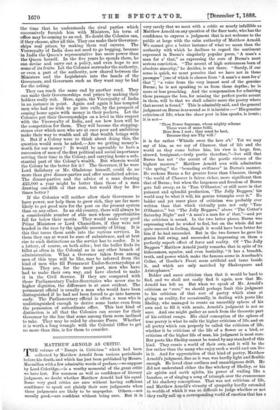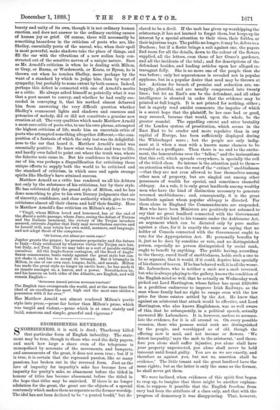MATTHEW ARNOLD AS CRITIC.
THE volume of "Essays in Criticism" which had been collected by Matthew Arnold from various periodicals before his death, and which has just been published by Messrs. Macmillan with a few admirable words of preface,—we suppose by Lord Coleridge,—is a worthy memorial of the great critic we have lost. For sureness as well as confidence of literary judgment, we doubt whether Matthew Arnold had his equal. Some very good critics are sure without having sufficient confidence to speak out plainly their sure judgments when those judgments are likely to be unpopular. 0 thers,—not usually good,—are confident without being sure. But it is
very rarely that we meet with a critic so nearly infallible as Matthew Arnold on any question of the finer taste, who has the
confidence to express a judgment that is not welcome to the public at large with the calm authority of Matthew Arnold.
We cannot give a better instance of what we mean than the authority with which he declines to regard the sentiment expressed in Burns's singularly popular poem, "A man's a man for a' that," as expressing the core of Burns's most serious conviction. "The accent of high seriousness born of absolute sincerity," he decides, is not there. "Surely, if our sense is quick, we must perceive that we have not in these passages" [one of which is chosen from "A man's a man for a' that "] "a voice from the very inmost soul of the genuine Burns ; he is not speaking to us from those depths; he is more or less preaching. And the compensation for admiring these passages the less, for missing the perfect poetic accent in them, will be that we shall admire more the poetry where that accent is found." This is admirably said, and the general
judgment on Burns is as sound as it is incisive :—" His genuine criticism of life, when the sheer poet in him speaks, is ironic ; it is not— 'Thou Power Supreme, whose mighty scheme
These woes of mine fulfil, Here firm I rest ; they must be best, Because they are Thy will :'
it is far rather Whistle owre the lave o't.' Yet we may
say of him, as we say of Chaucer, that of life and the world as they come before him, his view is large, free, shrewd, benignant,—truly poetic therefore,"—but still that Burns has not "the accent of the poetic virtues of the highest masters." Matthew Arnold sees with admiration "the spring," the "bounding swiftness" in Burns's manner. He reckons Burns a far greater force than Chaucer, though "the world of Chaucer is fairer, richer, more significant than that of Burns ; but when the largeness and freedom of Burns gets full sweep, as Tam O'Shanter,' or still more in that puissant and splendid production, The Jolly Beggars,' his world may be what it will, his genius triumphs over it." No bolder and yet surer piece of criticism was probably ever written than that which virtually puts not only "Tam O'Shanter," but "The Jolly Beggars," above "The Cotter's Saturday Night" and "A man's a man for a' that,"—and yet the criticism is sound. In the two latter pieces, Burns was expressing what he wished to feel, but on the whole did not quite succeed in feeling, though it would have been better for him if he had succeeded. But in the two former he gave his g'enius full swing, and succeeded in impressing on them a perfectly superb effect of force and reality. Of "The Jolly Beggars" Matthew Arnold justly remarks, that in spite of its hideousness, squalor, and even bestiality, "it has a breadth, truth, and power which make the famous scene in Auerbach's Cellar, of Goethe's Faust, seem artificial and tame beside it, and which are only matched by Shakespeare and Aristophanes."
Bolder and surer criticism than that it would be hard to find, and we shall not easily find it again, now that Mr. Arnold has left us. But when we speak of Mr. Arnold's criticism as "sure," we should perhaps limit this judgment to his criticism of that sort of poetry which aims at giving us reality, for occasionally, in dealing with poets like Shelley, who managed to create an unearthly sphere of his own and to fill it with music, Arnold's judgment is not so sure. And one might gather as much from the theoretic part of his critical essays. His chief conception of the sphere of true poetry is what he calls the higher criticism of life, and on all poetry which can properly be called the criticism of life, whether it be criticism of the life of a flower or a bird, or criticism of the higher life of man, his judgment is most sure. But poets like Shelley cannot be tested by any standard of this kind. They create a world of their own, and it will be the few rather than the many who enjoy such a world and can live in it. And for appreciation of that kind of poetry, Matthew Arnold's judgment, fine as it was, was hardly light and flexible enough. He loved clear outlines and unambiguous drift. He did not understand either the fine witchery of Shelley, or his air spirits and earth spirits, his power of wailing like a banshee, or of singing a song of triumph over the evanescence of his shadowy conceptions. That was not criticism of life, and Matthew Arnold's vivacity of sympathy hardly extended to worlds of which it was so difficult to judge whether or not
they really call up a corresponding world of emotion that has a
beauty and unity of its own, though it is not ordinary human emotion, and does not answer to the ordinary exciting causes Of human joy or grief. Of course, there will necessarily be something hazardous in the criticism of poets who are, like Shelley, essentially poets of the unreal, who, when their spell is most powerful, make shadows take the place of things, and fill the ear with the vibrations of a new asolian harp con- structed out of the sensitive nerves of a unique nature. Sure as Mr. Arnold's criticism is when he is dealing with Wilton, or Gray, or Burns, or Wordsworth, or Keats, or Byron, he is thrown out when he touches Shelley, more perhaps by the want of a standard by which to judge him, than by want of sympathy, but probably to some extent by both causes. Indeed, perhaps this defect is connected with one of Arnold's merits as a critic. He always asked himself so pointedly what it was that a poet meant to convey, and whether he had really suc- ceeded in conveying it, that his method almost debarred him from answering the very difficult question whether Shelley's evanescent lights and shadows and essences and potencies of melody, did or did not constitute a genuine new creation at all. The very qualities which made Matthew Arnold a most sure critic of poets who, to use his own phrase, attempted the highest criticism of life, made him an uncertain critic of poets who attempted something altogether different,—the com- position of a fantasia of which the only test was its delightful- ness to the ear that heard it. Matthew Arnold's mind was essentially positive. He knew what was false and true to life, and hardly ever failed to point out where the truth was, where the falsetto note came in. But his confidence in this positive ear of his, was perhaps a disqualification for crticiising those unique efforts to supply both the world to be criticised and the standard of criticism, in which once and again strange spirits like Shelley's have attained success.
Matthew Arnold as a critic has rendered us all his debtors not only by the substance of his criticisms, but by their style. He has celebrated duly the grand style of Milton, and he has done something to give to his own literary judgments that air of sincerity, confidence, and clear authority which give to true criticisms almost all their charm and half their finality. Here is Matthew Arnold's fine criticism on Milton's style :—
" Virgil, whom Milton loved and honoured, has at the end of the ,En,eid a noble passage, where Juno, seeing the defeat of Turnus and the Italians imminent, the victory of the Trojan invaders assured, entreats Jupiter that Italy may nevertheless survive and be herself still, may retain her own mind, manners, and language, and not adopt those of the conqueror.
'Bit Latium, sint Albani per semis reges
Jupiter grants the prayer; he promises perpetuity and the future to Italy—Italy reinforced by whatever virtue the Trojan race has, but Italy, not Troy. This we may take as a sort of parable suiting ourselves. All the Anglo-Saxon contagion, all the flood of Anglo- Saxon commonness, beats vainly against the great style but can- not shake it, and has to accept its triumph. But it triumphs in Milton, in one of our own race, tongue, faith, and morals. Milton has made the great style no longer an exotic here ; he has made it an inmate amongst us, a leaven, and a power. Nevertheless he, and his hearers on both sides of the Atlantic, are English, and will remain English-
' Sermonem A11E1011/j patritun moresque tenebnnt:
The English race overspreads the world, and at the same time the ideal of an excellence the most high and the most rare abides a possession with it for ever."
Has Matthew Arnold not almost rendered Milton's poetic style into prose,—prose far better than Milton's prose, which was turgid and violent,—prose which is at once stately and lucid, sonorous and simple, graceful and vigorous











































 Previous page
Previous page